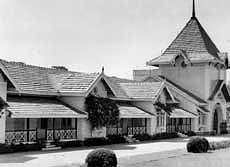
Modern-day realities such as bomb blasts and terror attacks have often meant heated public debates on the question of police reforms. With technological advancements and the incidence of cyber crime, day-to-day policing has taken on a new role too, and the institution has had to cope with these demands. While these emerging dimensions are posing a stiff challenge to police administration, the very complexities of police work have also been attracting greater talent. This is true of Karnataka too.
The post of Inspector General was upgraded and re-designated as Director General and Inspector General of Police in 1982 to enable him to oversee the onerous task of prevention and detection of crime and maintenance of law and order more effectively.
A long history of reforms
But, there’s nothing new about this talk of reforms. In fact, when one looks at the 125-year-old history of the institution, it is punctuated with illustrious police officers who have tried to bring in changes for better administration.
Take the case of E G B Peel (1939-1942) for instance. The Englishman is said to have possessed a reformatory zeal similar to his more illustrious namesake Robert Peel, Prime Minister of England, father of modern policing and founder of Scotland yard which earned the sobriquet ‘Bobby’ for the London cop.
He reorganised the State CID, so as to cope with the three-fold functions of Intelligence, Expert Criminal Investigation and Control of Criminal Tribes. Today, a Director General of Police and an Inspector General of Police are heading the State CID and the Intelligence Wing respectively. Today, the Criminal Tribes Act has been replaced by the more humane Habitual Offender’s Act as no citizen of free India can be branded a born criminal. Apart from Peel, four other Englishmen, George William Lancelot Ricketts, F E C Carr (1904-1908), P F Bowring (1923-1927) and F A Hamilton (1930-1939) occupied the coveted post of IG.
In fact, Ricketts was the first Inspector General of Police of Mysore when he was appointed in the newly created post on November 1, 1885. He was a true blue Bangalorean, and baptized in Bangalore on September 20, 1832.
But, the contributions of Indian IGs who worked in the erstwhile Mysore state towards improving the institution cannot be undermined. In fact, Ricketts’ successor Vishwanath Pathankar Madhava Rao was instrumental in the promulgation of the Mysore Police Regulation which sought to render the police force as efficient as possible.
Later, Sardar Dalavoy Devaraj Urs (1908-1911) went on a tour of Poona-Bombay and Vellore in order to study the working of CID and the Police Training School respectively.
Eclectic backgrounds
The role of Dewans during the Wodeyar rule cannot be underestimated. Dewan K Sheshadri Iyer’s son K Sheshadri Doreswamy Iyer as well as the former’s son-in-law A Subramanya Iyer served as IGPs at different points in time.
Interestingly, the Inspectors General of Police came from backgrounds as varied as judiciary, treasury, revenue, municipality, health, prisons, registration, and excise departments.
They also went on to hold coveted positions on other fronts. While Englishman Ricketts served as the first Editor of the Mysore Gazette, he went on to hold many positions such as the Director of Agriculture and Statistics, Inspector General of Forest and Excise Commissioner.
Other IGs such as V P Madhava Rao (1892-1898) went on to become the Dewan and M Sheshadri (1942-43) Minister of Agriculture and later, Home.
N V Babu Reddy was the first to be appointed as a police probationer in 1933 and he went on to become IG of Police in 1952. Later he lent his services to the Intelligence Bureau and Railway Protection Force in the Government of India after which he superannuated in 1962 as Vice Chairman, Mysore Government Road Transport Department.
The only rare instance when an IG was compulsorily retired from service in the pre-Independence era was of G Sunder Rao (1946-1947), though one is unable to figure out the reasons behind his ignominy.
The distinction of being the longest serving IG of Police goes to Sathyendra Nath Hosali. He was IGP for 12 years between 1958 and 1971.
Such a long tenure at the helm is the envy of officers today. There has since been an instance of a DG and IG of Police serving for just a period of one month!
Common man’s apathy
While there have been many reforms in policing, there has been one constant, that of the common man’s attitude towards the police. Not much seems to have changed on that front, even 63 years after the end of the British Raj.
A case in point is the admission of Inspector General Sreekanteshwara Iyer (1912-1917) in the administrative report of the department. He records, “Another matter bearing directly upon the success of the police administration is the attitude of the people towards the Police. They are apathetic towards aiding in investigation and reporting of crime…people have to understand that the police are after all their friends who are maintained to safeguard their lives and property and freely resort to them for help…both have to work and meet half way co-operating with each other, when alone the ideal of the police can be attained.”
But the reasons for that apathy could open up another debate altogether. Which could again bring us back to the question of police reforms.
(The author is the Additional Director General of Police (Recruitment & Training. He may be contacted at stramesh1@rediffmail.com)
